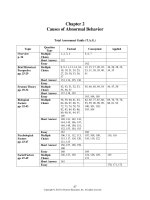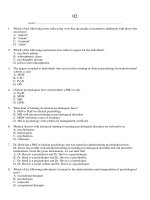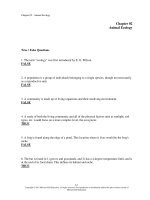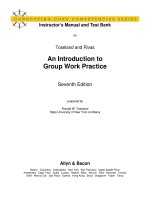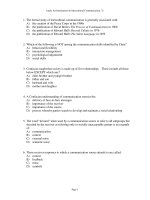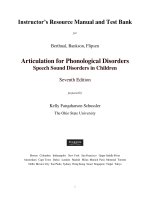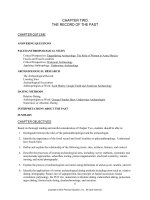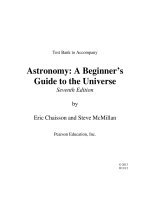Carpers understanding the law 7th edition mckinsey test bank
Bạn đang xem bản rút gọn của tài liệu. Xem và tải ngay bản đầy đủ của tài liệu tại đây (180.17 KB, 14 trang )
CHAPTER TWO
True-False
Any element of falsity renders the statement false.
1.
The constitutional doctrine of “incorporation” guarantees that a President cannot veto salary
increases for federal judges.
Answer: F
2.
As part of a states inherent sovereignty (power to govern), a state possesses police power to
regulate private activities to protect or promote the public health, safety, or general welfare of their
citizens.
Answer: T
3.
A sitting president can be compelled by subpoena to testify in a civil lawsuit, because “the Law is
King.”
Answer: T
4.
The natural law principle of private domain provides that an individual is free to do anything he or
she chooses, unless specifically prohibited or circumscribed by reasonable positive law.
Answer: T
5.
Natural law is a legal theory holding that such law precedes all man-made laws and recognizes the
fundamental dignity of every human being.
Answer: T
6.
Only state supreme courts may declare state laws null and void.
Answer: F
7.
As the national government can tax states, so it is that states can tax the national government.
Answer: F
8.
The president may kill a bill by veto, but the legislature may resuscitate the bill by overriding the
presidential veto by a 2/3 vote.
Answer: T
9.
The Supreme Court may void a statute even if it has been passed by a 2/3 vote overriding a
presidential veto, if it determines the statute to be unconstitutional.
2 Chapter Two
Answer: F
10.
The president can veto part of budget legislation and approve the remainder, which then becomes
law.
Answer: F
11.
Members of the House of Representatives are allocated to the states on the basis of population, as
determined by the decennial national census.
Answer: T
12.
The president is the Commander in Chief of the armed forces, but unlike other members of the
armed forces is not subject to the Uniform Code of Military Justice.
Answer: T
13.
The police power of government simply means the power to arrest, prosecute, and punish criminals.
Answer: F
14.
Under the “incorporation doctrine,” the Supreme Court has imposed most of the governmental
limitations of the Bill of Rights on the state governments by interpretation of the due process clause
of the Fourteenth Amendment.
Answer: T
15.
Federal judges are appointed for a period of “good” behavior. The only way to remove a judge for
“bad” behavior is through impeachment and removal from office.
Answer: T
16.
Judicial review is the power of Congress to declare an act of the federal government
unconstitutional.
Answer: F
17.
The constitutional doctrine of separation of powers speaks of the relationships between the national
government and the state governments.
Answer: F
18.
The president of the United States can terminate the office of any and all federal judges if done
within six months of the president taking office.
Answer: F
19.
The Constitution provides congress with the power to regulate business activities that affect
Test Bank 3
interstate commerce.
Answer: T
20.
The federal legislative branch is unicameral and the federal constitution requires that state
legislatures be tricameral.
Answer: F
21.
The Supreme Court contains nine justices all appointed for six year terms by President.
Answer: F
22.
The Supremacy Clause provides that federal law overrules state law.
Answer: T
23.
The states are granted the authority to regulate interstate commerce through treaty, agreement or
mutual cooperation.
Answer: F
24.
The First Amendment provides a guarantee of the freedom to speak under all circumstances
Answer: F
25.
Government can neither establish religion nor prevent the free exercise thereof.
Answer: T
26.
Judicial review is the power of the judiciary to declare an act of the federal government
unconstitutional.
Answer: T
Fill-ins
Complete each sentence or statement.
1.
_________________means any activity that crosses state boundaries.
means any activity that occurs entirely within a state’s boundaries.
Answer: Interstate; Intrastate
2.
A formal written order called a(n) ____________ requires that an arrestee be brought before
a court, usually to protect against abusive incarceration without release on bail, pending a formal
trial.
Answer: writ of habeas corpus
3.
An act of the legislature punishing a named individual or member of a specific group without a
4 Chapter Two
judicial trial is a(n) ___________________ and such a law is prohibited by the Constitution.
Answer: bill of attainder
4.
The constitutional doctrine of separation of powers is concerned with the functions of the
________________ , the _________________ , and the___________________ branches of
government.
Answer: legislative; executive; judicial
5.
One justification for a rationalization of civil disobedience of ____________ law is that the
violator is nevertheless complying with a higher standard of conduct, namely the
law.
Answer: positive; natural
6.
The Supreme Court, in Marbury v. Madison, assumed exclusive power to ______________the
meaning of the various clauses of the U.S. Constitution.
Answer: interpret
7.
The Supreme Court’s power of judicial review permits it to declare _____________ any
federal or state law that violates the Constitution.
Answer: unconstitutional OR null and void
8.
Regardless of the population of a state, each will be represented by _____________ U.S.
Senators.
Answer: two
9.
The separation of powers among the three basic branches of government permits considerable
specialization of duties. The legislature engages primarily in __________________ , laws. the
executive engages primarily in ___________________ laws, and the judiciary engages primarily in
_________________disputes over the application of the laws.
Answer: enacting; enforcing; adjudicating
10.
Because the number of members in the federal _____________ is limited to 435, the seats
must be reallocated periodically on the basis of __________________ as determined by the
decennial national census.
Answer: House of Representatives; population
11.
The process to remove a federal official or judge from office is called ____________ and is
conducted by __________________ .
Answer: impeachment; U.S. Congress
12.
The ________________ on corporations and on individuals is the most important single source
of revenue for the federal government.
Answer: income tax
13.
Test Bank 5
The president has the constitutional power to make treaties with foreign countries, but they must be
approved by a(n) __________________ vote of the___________________ . This is an example of
the
found in our Constitution.
Answer: two-thirds; Senate; checks and balances
14.
A system where two or more levels of government direct the affairs of the same people in the same
nation is called __________________. .
Answer: federalism
15.
The requirement of an opportunity to citizens be heard and/or defend their rights in a fair hearing
before the federal government can take an action adverse to the interests of the citizen is an
example of requirements found in the ___________________of the ________________ .
Answer: due process clause, Fifth Amendment.
16.
The ________________ is the popular title given to the first ten amendments to the U.S.
Constitution.
Answer: Bill of Rights
17.
Under Supreme Court rulings, a person who defiantly and disrespectfully burns the flag of the
United States is shielded from prosecution because of the _________________Amendment.
Answer: symbolic speech; First
18.
The __________________prohibits government from restricting or infringing the right to bear
arms.
Answer: Second Amendment
19.
A law passed with retroactive application, such as making certain prior conduct a crime, is called
a(n)____________ ____ law.
Answer: ex post facto
20.
A city ordinance intended to criminalize begging or loitering would be an example of a specific
power of government, called the _________________.
Answer: police power
21.
Under the equal protection clause of the
, a restriction or eligibility requirement
based upon the race of the affected individuals(s) enacted by a state government must meet the socalled _______________ test, meaning that the state must demonstrate a compelling interest
served by a narrowly tailored requirement.
Answer: Fourteenth Amendment, strict scrutiny
6 Chapter Two
Multiple Choice
Select the one best answer.
1.
Which of the following statements does not reflect a natural law principle included in the
Constitution?
a. No government official—legislator, executive, or judge—is above the law; all are subject to it.
b. Certain fundamental human rights are inalienable.
c. Every person is legally entitled to a formal education to the limit of his or her ability to learn.
d. All human beings possess fundamental rights to life, liberty, and property.
Answer: c
2.
Constitutionalism means
a. federal, state, and local governments must be democratic.
b. fundamental principles of law governing a nation must be expressed in a written document.
c. a central government must be supreme over a federation of states.
d. there are enforceable limits on the exercise of government power, and the private domain of
every individual may not be invaded unless in accordance with reasonable positive law.
Answer: b
3.
A proposed law that is constitutionally suspect may be
a. rejected by vote of the legislature, before enactment.
b. vetoed by the chief executive, after enactment by the legislature.
c. ruled unconstitutional by the appropriate court.
d. any of the above
Answer: d
4.
The commerce clause of the Constitution permits Congress to regulate both interstate and foreign
commerce. Which of the following situations is least likely to invoke federal jurisdiction?
a. A used car salesman rolls back the odometer of a car offered for sale to the public.
b. A farmer grows corn to be sold to a national health food cooperative.
c. A trucking company, to comply with state regulations, purchases front and rear reflectors for its
trucks that will travel on the public highways.
d. A salesperson accepts an order for 500 tons of rice for export to Japan.
Answer: a
5.
Which of the following is not a part of the doctrine of separation of powers?
a. arbitration function
b. legislative function
c. executive function
d. judicial function
Answer: a
6.
Members of the federal judiciary are
a. elected to office for life by the senates of the states where the courts are located.
Test Bank 7
b. appointed by the president and confirmed by majority vote of the U.S. Senate.
c. designated in a binding recommendation by the senior senator of the state where the court is
located.
d. required to retire at age 70.
Answer: b
7.
Which of the following is not a power of the president under the Constitution?
a. the power to serve as Commander in Chief of the armed forces
b. the power to make treaties by and with the advice and consent of the Senate provided twothirds of the Senators present concur
c. the power to raise taxes
d. the power to enter into executive agreements
Answer: c
8.
Which of the following is not included in the right of privacy?
a. the right to have access to contraceptives
b. the right to smoke marijuana in a private club
c. the right of a person to marry a person of another race
d. the right to possess obscene materials in one’s home
Answer: b
9
Which of the following statements is not true of the separation of powers within the three functional
branches of government?
a. Power is distributed among the three branches of government.
b. Separate powers of the respective branches are exclusive and not shared.
c. This governmental structure restrains the natural tendency to expand granted power.
d. Each branch checks the other two.
Answer: b
10
Which of the following is not a government within our national system of federalism?
a. the United States government
b. state and local governments
c. the United States Chamber of Commerce and its network of local branches
d. special government districts, such as those for school, park, or flood control purposes
Answer: c
11
Constitutional “due process of law” requirements do not apply to actions of
a. private colleges.
b. the federal government.
c. state governments.
d. counties, cities, or special district governments.
Answer: a
12
The famous case of Marbury v. Madison (1803) established the constitutional doctrine of
a. judicial review.
8 Chapter Two
b. presidential prerogative.
c. congressional power over the budget.
d. administrative agency powers.
Answer: a
13
Under the Constitution as amended, suffrage (or the right to vote in U.S. political elections), is not
available to
a. adult women.
b. foreigners with work visas.
c. adult men.
d. persons in the military.
Answer: b
14
If subpoenaed to appear in federal court, or before a federal grand jury, the president has the
following lawful choices, except
a. assert “executive privilege” and refuse to appear regardless of court rulings.
b. appear, but assert the Fifth Amendment privilege against self-incrimination.
c. appear and answer questions, but answer in a self-serving way so long as technically truthful.
d. challenge the subpoena and refuse to appear until the issue is resolved by an appellate court.
Answer: a
15
Judicial review means that the
a. president has the power to appoint judges.
b. Congress has power under the Constitution to grant pardons.
c. Chief Justice is always appointed from the current members of the Supreme Court.
d. Supreme Court has the power to declare legislative acts unconstitutional.
Answer: d
16
Which of the following is not a specific power of voters to participate directly in state government?
a. the appointment of judges
b. the direct initiative
c. the referendum petition
d. the recall petition
Answer: a
17. Which of the following is not one of the supreme laws of the U.S.?
a. a treaty of the United States
b. a statute of a state
c. a constitutional amendment
d. a statute of the United States
Answer: b
18. Which of the following statements is not true regarding the Bill of Rights?
a. Freedom of religion is expressed in the First Amendment.
Test Bank 9
b. Originally, the Bill of Rights applied only to limit or restrain the national government.
c. Incorporation is the legal doctrine imposing the guarantees of the Bill of Rights upon the states.
d. The Bill of Rights was ratified by a simple majority of the original 13 states.
Answer: d
19.
Following impeachment, a federal judge or the president may be convicted of high crimes and
misdemeanors and removed from office following the vote of
a. 51 U.S. Senators.
b. 2/3 of the House of Representatives.
c. 51% of the U.S. Senators who choose to vote on the issue.
d. 2/3 of the U.S. Senators who choose to vote on the issue.
Answer: d
20.
What free speech activity has been held by the Supreme Court to be protected under the First
Amendment?
a. the symbolic act of burning an American flag
b. smoking crack to protest government criminalization of private ingestion of chemicals
c. killing oneself in protest of war
d. yelling bomb as a joke in a crowded stadium
Answer: a
21.
In the year 2000 presidential election,
a. George W. Bush won the electoral vote because he won the popular vote.
b. George W. Bush won the electoral vote after the U.S. Supreme Court stopped a Florida recount
that had been ordered by the Florida Supreme Court.
c. George W. Bush won the popular vote after the U.S. Supreme Court refused to rule on a
challenge brought by Albert Gore regarding vote counting in New York.
d. Although Albert Gore won the electoral vote, George W. Bush was declared president because
he won the popular vote.
Answer: b
22.
A statute prohibiting abortion except in specified situations could be determined to be either
constitutional or unconstitutional by
a. legislative research during the enactment process.
b. high court review immediately following enactment.
c. judicial review and decision as a result of an aggrieved person’s appeal.
d. declaratory judgment rendered by the U.S. Supreme Court.
Answer: c
23. Which of the following is accurate regarding the legality of affirmative action programs:
a. Under recent Supreme Court decision they are unconstitutional because they constitute
discrimination on the race or other protected classifications of people.
b. Government is prohibited from enacting any new affirmative action programs but existing ones
are “grandfathered” in so long as they remain continually in use.
c. Hard quotas are acceptable under most circumstances
d. Hard quotas are probably not allowed but programs granting preferences or assistance to
individuals based on race are probably constitutional.
10 Chapter Two
Answer: d
24. A television commercial created and paid for by trade association advocating a particular viewpoint
on a current issue in United States politics
a. Is probably highly protected speech under the First Amendment
b. Is probably commercial speech granted no protection under the First Amendment
c. Is probably commercial speech granted limited protection under the First Amendment
d. Is not “speech” meaning that the First Amendment does not apply to it.
Answer: a
25. Under the Commerce Clause, a state law that affects interstate commerce
a. is unconstitutional.
b. could be allowed if the protected interest and the need to protect it outweighs the burden
placed upon commerce.
c. is allowed so long as it receives a vote of support in the United States Senate
d. is constitutional provided that the law focuses on trade with foreign nations.
Answer: b
Short Answer Essays
1.
Take the pro or con of the argument that prospective appointees to the U.S. Supreme Court ought to
publicly reveal their personal philosophy upon each of the largest issues or controversies in society,
such as abortion rights, prayer in public schools, flag burning, gun control, and desensitization to
violence in the media.
Answer:
Answers here may vary widely, but should receive good grades if they identify practical
difficulties, such as the inability to find any candidates satisfactory to all, despite possible
theoretical benefits.
2.
What is meant by the nationalization of the Bill of Rights? Explain why nationalization was
necessary and how it came about.
Answer:
Students should discuss how the doctrine of selective incorporation by the Supreme Court has
been instrumental in forcing the states to comply with the guarantees of the Bill of Rights. An
explanation of the process of incorporation and how the court rationalized use of the Fourteenth
Amendment to accomplish this end would be a complete answer. Superior students might
hypothesize the situation today if certain provisions of the Bill of Rights had not been
incorporated.
Test Bank 11
3.
What is meant by the words “...all Men are created equal...” in the Declaration of Independence?
Answer:
It means that all persons have equal rights to life, liberty, and the pursuit of happiness, and
these terms have been extended to the right to property and to due process of law and various other
identified rights under law. Obviously the language was never intended to suggest absolute
equality. Notable differences include characteristics such as health, appearance, strength, race,
gender, agility, income, personality, ambition, energy, ability, skill, wit, size, talent, beauty,
education, wealth, longevity, geographical location, relatives, friends, associates, height, weight,
etc.
4.
Briefly describe and explain the constitutional doctrine of federalism.
Answer:
The definition of federalism as a political arrangement in which two or more levels of
government direct the affairs of the same people should be a central part of the answer. Some
recognition that local and regional differences ought to be reflected in the system of governance
should be given, however.
5.
Briefly describe the constitutional doctrine of separation of powers, noting particularly the
uniqueness of such a doctrine.
Answer:
The answer should identify the various elements of the doctrine of separation of powers, and
show the special way that the powers and functions of the U.S. government are shared, as well as
how the separation of powers forms a unique system of checks and balances. It is unique in the
sense that it inhibits the development of centralized power, namely a dictatorship.
6.
The office of the United States Attorney General, responsible for the entire federal law enforcement
system, is an adequate safeguard against abuses by the presidency. Take either the pro or con of this
statement.
Answer:
On the one hand, the Attorney General has all the resources necessary to protect against
presidential abuses (e.g., direct access to federal courts and grand juries and their subpoena power,
government investigatory agencies, resources and budget). On the other hand, being appointed by
the president, there is a question of whether or not the Attorney General always would have the will
to investigate or prosecute. And even if he or she does, will the Attorney General’s judgment be
respected by the people?
7.
Define and give an example of the doctrine of incorporation.
Answer:
Seventy-five years after the enactment of the Fourteenth Amendment, the Court began to
12 Chapter Two
interpret the due process clause of that amendment to restrict the States from interfering with
certain individual freedoms identified in the Bill of Rights. Among the recognized rights that are
protected from state infringements are freedom of speech, freedom of religion, freedom from
double jeopardy, and the right to protection from self-incrimination and illegal search and seizure.
8.
Explain the guarantee of due process contained within the Constitution.
Answer:
There are two due process clauses in the Constitution, one in the Fifth Amendment that applies
to federal government and one in the Fourteenth Amendment that applies to state and local
government. These clauses require that individuals deprived of life liberty or property be given due
process of the law. The clauses have been highly debated and extensively interpreted. Generally
the clauses require a fair hearing and treatment for many interests, especially individuals accused of
a crime, or some form of a fair opportunity to defend one’s interest.
9.
Read the following story: Now, assume a media outlet acquired the names of the Navy Seals who
were involved in the Abbottabad raid. Make an argument either 1) that a prior restraint is justified
to preclude the release of the names or 2) that it is not justifiable. Support your answer with the
First Amendment law of prior restraints. Subsequently, the point man on the team wrote a book
about their mission, No Easy Day. Why couldn’t the government stop publication of the book?
Answer:
Fear of retribution by local terrorist cells could jeopardize the Seals, distract their attention, and
inhibit them from performing their duties. The failure to issue a prior restraint would jeopardize
national security because it would discourage anyone from serving in such a capacity in the future
for fear that a subsequent release of their names would endanger themselves and their families for
the rest of their lives. On the other hand, in the absence of proof of immediate, irrevocable damage
to the Nation, the media should have access to the names of the individuals because who they are is
certainly truthful and newsworthy information. The general argument against prior restraints is that,
for there to be an effective restraint upon executive branch policy and power in national defense,
there must be an enlightened citizenry, and that without an informed and free press, there cannot be
an enlightened citizenry. For that reason, it would be difficult for the government to stop the
publication of information about the raid after it had occurred, even though it may be of interest to
our enemies.
10.
California enacted a law that imposed restrictions and a labeling requirement on the sale or rental of
violent video games to minors. The 9th Circuit Court of Appeals struck it down as violating the
First Amendment. Brown v. Entertainment Merchants Association, 131 S. Ct. 2729 (2011).
Search the internet and find how the Supreme Court held. Do you agree? Why or why not?
Answer:
The Court held that because the Act imposes a restriction on the content of protected speech, it was
invalid unless California could justify the restriction by a demonstrating a compelling government
interest that is narrowly drawn to serve that interest. The Court determined that California did meet
that standard because it could not show a direct causal link between violent video games and harm
to minors. The State's evidence on that issue was not deemed to be compelling. California relied
Test Bank 13
primarily on the research of psychologists whose studies purport to show a connection between
exposure to violent video games and harmful effects on children. But the studies did not prove that
violent video games cause minors to act aggressively.
11.
Watch the following video (5 ½ minutes): This
video serves to flush out an important distinction in constitutional law. The government can
prosecute persons who wrongfully acquire (steal) information. But whether or not it can stop the
press from releasing that information is an entirely different matter because of the First
Amendment. Do you think that if Bradley had turned the information over to the NY times (like
Mr. Ellsberg did) instead of Wiki Leaks, that a federal district court would have issued an
injunction to stop the NY Times from printing the information (a prior restraint)? In the Wiki Leaks
incident tons of confidential information was released, whereas in the Pentagon Papers case, there
fewer volumes of classified material. Should the quantity of information make a difference in the
decision to issue an injunction? On the other hand, what about the editorial role of the NY Times in
the Pentagon Papers case? In other words, is it more acceptable to just release it all rather than
permitting the editor of the NY Times instead of the President to determine what should remain
classified by selectively releasing information? And Mr. Bradley—hero or zero? Give your
opinion.
Answer:
The critical test for the Times would have been whether or not national security trumped its
right to publish the information. There is a high constitutional bar for the issuance of a prior
restraint, although threats to national security interests may prevail over freedom of the press.
Clearly the embarrassment of governmental officials is insufficient, although the imminent
compromising of global security interests may pass the bar. The quantity of information is not
important except in the context of that issue. The more information and details provided, the
more likely national security will be at risk. On the other hand, a single publication of "the
sailing dates of transports or the number and location of troops" could justify a prior restraint.
Near v. Minnesota, 283 U.S. 697 (1931). The all or nothing issue is interesting: Would we
prefer for the media to exercise censorship in the selection of the information to publish in its
editorial capacity any more than the government? Students’ opinion will vary on that issue as
well as on how they view Mr. Bradley.
12.
We are accustomed to seeing advertising like this one:
But before 1976, an attorney could be
subject to disciplinary action by the state bar association for advertising because it was considered
“unprofessional.” In Bates v. State Bar of Arizona, two attorneys, licensed to practice law in
Arizona, opened a law office, which they called a "legal clinic," in Phoenix, aiming to provide legal
services at modest fees to persons of moderate income who did not qualify for governmental legal
aid. After conducting their practice in this manner for two years, they concluded that their "legal
clinic" could not survive unless the availability of legal services at low cost, and their fees for
performing such services, were advertised. Consequently, in violation of Disciplinary Rules which
prohibited Arizona lawyers from publicizing themselves by "commercial" means, the two attorneys
placed an advertisement in a Phoenix newspaper, stating that they were offering "legal services at
very reasonable fees," and listing their fees for uncontested divorces, uncontested non-business
bankruptcies, and other matters. On appeal, the United States Supreme Court held that the blanket
suppression of advertising by attorneys violated the free speech clause of the First Amendment,
since lawyers may constitutionally advertise the prices at which certain routine legal services will
14 Chapter Two
be performed. The court rejected arguments that such advertising would have an adverse effect on
professionalism, would be inherently misleading, would have an adverse effect on the
administration of justice, would produce undesirable economic effects, and would have an adverse
effect on the quality of legal services. What is good about attorney advertising and what is bad
about it, in your opinion?
Answer:
Advertisements inform the consumer about their legal rights and who to contact for representation.
Advertising for legal services provides consumers with the knowledge that a law firm exists and
with information about the services it offers. Without such advertisements, people in need of legal
representation may not know who to call or even that litigation is an option. On the other hand,
aggressive attorney advertisers may focus on vulnerabilities of their potential clients, and may have
their own interests at stake rather than the interests of the consumer/client. Such advertising also
serves to fuel the legal fires and makes an already litigious society even more apt to sue, if for no
other reason than to prompt a settlement.
